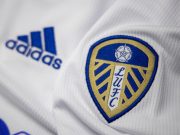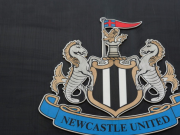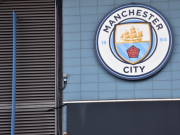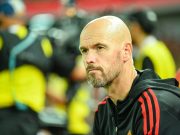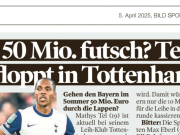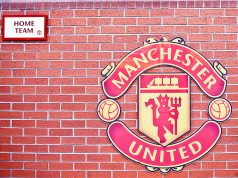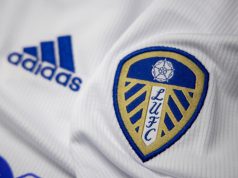20LEGEND reads the flag.
Legends are increasingly easier to become, but it’s hard to argue Ole Gunnar Solskjaer doesn’t hold a special place in Manchester United history.
It’s not just about that goal in 1999, there’s more to it. He came from nowhere (sorry Molde), respected the club during the times he wasn’t getting the chances he would have done elsewhere, played where told and produced often enough for his scoring record to be 126 goals in 366 matches.
And he wasn’t a star, not a ‘starry star’ at least. At a time when football celebrity was growing at a fast pace, Ole was just Ole. The baby faced assassin, or, more fairly, just a normal guy in extraordinary circumstances.
When the days of Jose Mourinho grew increasingly bitter and damaging, Solskjaer wasn’t a name in the running. Yet he was in the role quickly after the Portuguese storm left Old Trafford, and there was an immediate lift.
Perhaps anyone could have had the bounce, perhaps you could have done it, perhaps it was an almighty fluke. Arguments can, and will, be made on either side of the stance. That said, it can’t be denied that for many it felt like getting a little bit of Manchester United back.
The Glazers have been a financial drain on the club since they took over, with the soul always struggling to stay there… and even that seemed to start slipping under Mourinho. An Ole wave brought some cheer, however, there was always going to be a comedown, the Norwegian has football magic in his past but fairytales rarely see themselves out and, inevitably, the hard times came.
Missing out on the Champions League was a near-certainty before the change in manager, and then, Solskjaer got it to a point that failure to qualify was a disappointment.
That was the first strike for his detractors. And some of those were ready, waiting, to pounce. Their man Mourinho had been the answer. They’d been saying it for years, Louis van Gaal’s FA cup victory had been quickly diluted to an afterthought when the Jose circus rolled into town.
He could do no wrong for the Cult of Mourinho™, so players were thrown to the baying dogs and the journey, albeit bringing second tier trophies in the League Cup and Europa League, was a painful one.
Those who had wanted the manager for so long, and who had insisted with such effort that he’d be the man to Make Manchester United Great Again, became a social media army. Sometimes pride comes before the club you support, and this whole episode has been one of the better examples of that.
Van Gaal lived his final six months at Old Trafford overshadowed by the impending arrival of the only man who could be his replacement, and, to some extent, Solskjaer is playing the role of an unwanted stepfather to those who will now take more joy from Tottenham victories than those of their own club.
Solskjaer is mocked, as a man and as a professional. His record with the club as a player is even questioned, every bright point is met with negatives by a section, and each low point is grasped with glee by the Ole-Out brigade. With their green and gold membership cards showing how much more they care than others, they don’t fail to miss an opportunity.
Things may work out under the current manager, they may well not. Everything is a gamble, and those calling for a replacement present their choice as a sure-thing, handily ignoring all that has happened, at supposedly their club, since Sir Alex Ferguson left.
It’s the venom which grates. Sure, we can all have different opinions on football, but the enthusiastic social media mockery of a club legend, and the at times competitive nature of it, feels bizarre to many supporters.
Youth team prospects are handed the same mockery. Marcus Rashford, a 22 year old local lad who has scored 10 goals and provided four assists so far this season, is called Trashford by his own supporters much more than opposing ones.
His localness is perversely held against him by people who dismiss that as some worthless connection which shouldn’t bring any bearing when it comes to their joy or anger.
Maybe this is just social media, maybe these people just want their team to win at all costs. And that’s the thing, what is all costs?
Barcelona for years built up the idea of having a club DNA, to those outside it often appeared arrogant. Liverpool and their ‘This Means More’ campaign have done similar, positioning themselves as somewhat special among other, less worthy, football clubs.
But what of Manchester United? What even is Manchester United?
If you’re doing football support correctly then it’s a feeling, for so many it’s something which has defined a big part of their life. Whether that be because you grew up in the area, or had a family member introduce, no, force you into being fan, these are connections which will forever follow you.
Rarely, although perhaps increasingly, people choose their club. In which case if it’s purely about results then that could define support in much the same way personal connections do for others.
Maybe in that scenario there will always be something missing, especially if a wrong road is taken the first time expected glory isn’t granted. Should football support be almost solely related to results then there’s a hell of a lot being missed out on, the emotions and connection will be diluted and the joy can never be on the same level.
Ole Gunnar Solskjaer may ultimately fail, most managers do. Every manager at United since Ferguson has.
But what if… what if he didn’t? What if the unlikely boss managed to bring some of that glory at some point down the road?
That would be so, so special. It would be Manchester United and all the memories and connections that brings for so many people, it would be victory on steroids, a joy which is deeper than that which can be brought by an outsider.
Genuine emotion with friends, loved ones and strangers who you know feel the same way as you. There’d be nothing superficial about it, not a success, or a fix, to be quickly cast aside.
A gamble worth taking for a payoff which would, quite simply, be something else.
And if you don’t get that… you’re not doing football support correctly.


